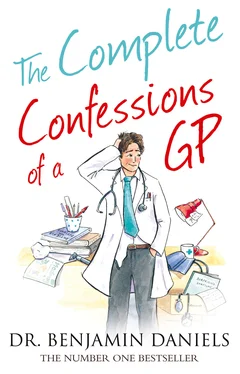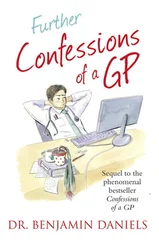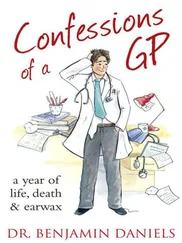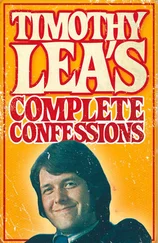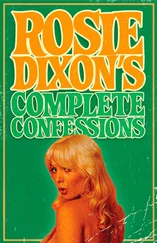Benjamin Daniels - The Complete Confessions of a GP
Здесь есть возможность читать онлайн «Benjamin Daniels - The Complete Confessions of a GP» — ознакомительный отрывок электронной книги совершенно бесплатно, а после прочтения отрывка купить полную версию. В некоторых случаях можно слушать аудио, скачать через торрент в формате fb2 и присутствует краткое содержание. Жанр: unrecognised, на английском языке. Описание произведения, (предисловие) а так же отзывы посетителей доступны на портале библиотеки ЛибКат.
- Название:The Complete Confessions of a GP
- Автор:
- Жанр:
- Год:неизвестен
- ISBN:нет данных
- Рейтинг книги:3 / 5. Голосов: 1
-
Избранное:Добавить в избранное
- Отзывы:
-
Ваша оценка:
- 60
- 1
- 2
- 3
- 4
- 5
The Complete Confessions of a GP: краткое содержание, описание и аннотация
Предлагаем к чтению аннотацию, описание, краткое содержание или предисловие (зависит от того, что написал сам автор книги «The Complete Confessions of a GP»). Если вы не нашли необходимую информацию о книге — напишите в комментариях, мы постараемся отыскать её.
The Complete Confessions of a GP — читать онлайн ознакомительный отрывок
Ниже представлен текст книги, разбитый по страницам. Система сохранения места последней прочитанной страницы, позволяет с удобством читать онлайн бесплатно книгу «The Complete Confessions of a GP», без необходимости каждый раз заново искать на чём Вы остановились. Поставьте закладку, и сможете в любой момент перейти на страницу, на которой закончили чтение.
Интервал:
Закладка:
During my training year I saw a middle-aged woman with stomach pains. I was very concerned and referred her urgently to the hospital because I thought she might have stomach cancer. She was seen and investigated within a week and turned out to simply have bad indigestion. When the snotty letter came back from the consultant, I was feeling a little red in the face. I had made an inappropriate expensive referral to the hospital and had caused unnecessary anxiety to the patient. I could just imagine the consultant grumbling into his endoscope as he cursed me for adding to his already busy day.
The patient and her husband, however, thought the sun shone out of my arse. ‘That wonderful Dr Daniels arranged for me to be seen so quickly.’ She bought me a very nice bottle of single malt to say thank you and told anyone who’d listen how fantastic I was. My poor medical judgement earned me a rather nice bottle of whisky and if my patient got to fill in one of the patient satisfaction questionnaires, I’d have been reported as the best doctor in the world.
Most medical practitioners have an idea whether they’re being good or bad doctors. On a Friday afternoon when I’m drained and tired, I know that I’m not giving my all. I try my best to remain professional but have to admit that I find it that bit harder to resist inappropriate requests for hospital referrals, sick notes and antibiotics. As GPs, we are supposed to be the ‘gatekeepers of the NHS’ but sometimes it can feel much easier to leave the gate permanently ajar rather than carefully defend the NHS hospital waiting lists by fending off the worried well. I’m very popular with my patients on a Friday afternoon because they are getting what they want, but I’m not always practising good medicine. Making the patient happy isn’t always the same as being a good doctor.
When I started as a GP I was told that it was easy to be a bad GP but hard to be a good one. A good doctor won’t prescribe antibiotics for a cold and won’t refer every patient with a headache for an expensive MRI scan. A good doctor should also be able to explain to the patient why he’s not agreeing to their demands, but sometimes, however hard you try, the patient leaves feeling dissatisfied and the doctor goes home feeling distinctly unpopular. It is a difficult balance to run on time but give each patient adequate individual attention, to allow patient choice but not give in to inappropriate demands, to keep referral rates low but make sure the patients get the expert input they need. I’m still not sure exactly what a good doctor is, but it is certainly more complex than earning a few smiley faces on a government questionnaire.
Connor
‘It’s my kids, Doctor. They’re little fuckers. I can’t control ’em no more. Something’s gotta be done about it. My youngest, Connor, was brought home by the police the other day.’
‘How old is Connor?’
‘He’s three.’
I rack my brains trying to think what a three-year-old could possibly do to get himself in trouble with the police.
‘They caught him putting rubbish through the neighbours’ letter boxes.’
‘Was he out on his own?’ I ask incredulously.
‘Oh no, Doctor, Bradley and Kylie was with him, but they was the ones telling him to do it.’
I skim through the notes to see that older siblings Bradley and Kylie are six and seven, respectively.
Mum Kerry is actually very likeable. She is a stereotypical council estate mum. Only 25, but already has three kids with three different men who are all now nowhere to be seen. Life is hard for her and she has very little support. She genuinely wants the best for her kids and really wants help.
Unfortunately for her, the entirety of my knowledge on child behaviour comes from having watched a couple of episodes of Supernanny on TV. I’ve never been the sternest of people and given the way my cat walks all over me, I’m probably not the best person to ask about discipline.
‘I think he’s got that DDHD condition. You know, where they’re little shits but it’s ’cause there’s something wrong with the chemicals in their brain and that.’
I’ve met lots of parents whose children have had a diagnosis of attention deficit hyperactivity disorder (ADHD). The parents love the label because it now excuses the bad behaviour. The kids run riot round my consulting room, rifling through my sharps bin and using my ophthalmoscope as a hammer. Mum and Dad do nothing to stop them and then say, ‘Sorry about the kids, Doc. It’s the ADHD – nothing we can do … brain chemicals and that.’
I don’t disbelieve that ADHD exists but perhaps it has been overdiagnosed in recent years. The main symptoms are lack of concentration, being easily distracted and not being good at listening. I could probably persuade myself that Connor has these symptoms, but I’m not sure that they are related to brain chemicals. I guess some children are more prone to developing these symptoms than others, but in most cases isn’t parenting more likely to be the most significant factor rather than a brain disease?
I’m not going to send Kerry’s kids to the child psychiatrist. The wait is long and I don’t want these children labelled as psychiatrically unwell. I’ve heard there is a specialist social worker locally who gives individual and group parenting skills classes. Kerry is perfect for her.
Kerry comes back a couple of weeks later to let me know how it went.
‘I really like my parenting support worker. She told me I mustn’t call ’em little fuckers no more but instead they are good children with some c.h.a.l.l.e.n.g.i.n.g behaviour.’
She goes on to tell me about how she is now rewarding good behaviour, setting consistent boundaries and using the naughty corner. Hold on a minute, I could have told her that. This parenting adviser must have watched the same episode of Supernanny that I saw.
Janine
Janine is nine years old and about 13 stone. She waddles into my room and then Mum waddles in after her. My room feels very small.
‘It’s her ankles, Doctor. They hurt when she runs at school. She needs a note to say that she can sit out games.’
‘Did you fall over or twist your ankle, Janine?’ I always try to engage with the child themselves if possible. Janine looks at the floor and then shakes her head. ‘How long have they been sore?’ Eyes still to the floor, this time I get a shrug.
‘Right, let’s have a look at these ankles then.’ I try to be engaging and smiley, stay positive and encouraging. I prod and poke her ankles and get her to move them around a bit. My examination is a bit of a show most of the time and today is no exception. One look at Janine walking into my room showed me that her ankles were basically normal. I try to make my prodding and poking look like it has purpose, but it is purely a performance for the benefit of Janine and her mum. I want them to think that I am taking them seriously, that I am genuinely looking for some ‘underlying ankle pathology’. As I prod away, I try to remember the names of some of the ankle ligaments … no joy there. Perhaps I’ll just try to remember which is the tibia and which is the fibula … no, just confusing myself now.
‘Right … Well, I can’t find any swelling or tenderness in those ankles … and she’s walking okay …’ This is the make or break moment … How am I going to put this tactfully? I am standing at the top of the diving board but do I have the bottle to make that jump? I could just write the note, prescribe some paracetamol syrup and climb quietly down the ladder. No, Daniels, come on, it’s your duty to say something. Right. Here goes. ‘Some children find that … erm err … that being a bit … erm …’ (Say it, Daniels, just say it)‘… erm overweight can make their joints hurt sometimes.’ I had done it. I had jumped!
Читать дальшеИнтервал:
Закладка:
Похожие книги на «The Complete Confessions of a GP»
Представляем Вашему вниманию похожие книги на «The Complete Confessions of a GP» списком для выбора. Мы отобрали схожую по названию и смыслу литературу в надежде предоставить читателям больше вариантов отыскать новые, интересные, ещё непрочитанные произведения.
Обсуждение, отзывы о книге «The Complete Confessions of a GP» и просто собственные мнения читателей. Оставьте ваши комментарии, напишите, что Вы думаете о произведении, его смысле или главных героях. Укажите что конкретно понравилось, а что нет, и почему Вы так считаете.
